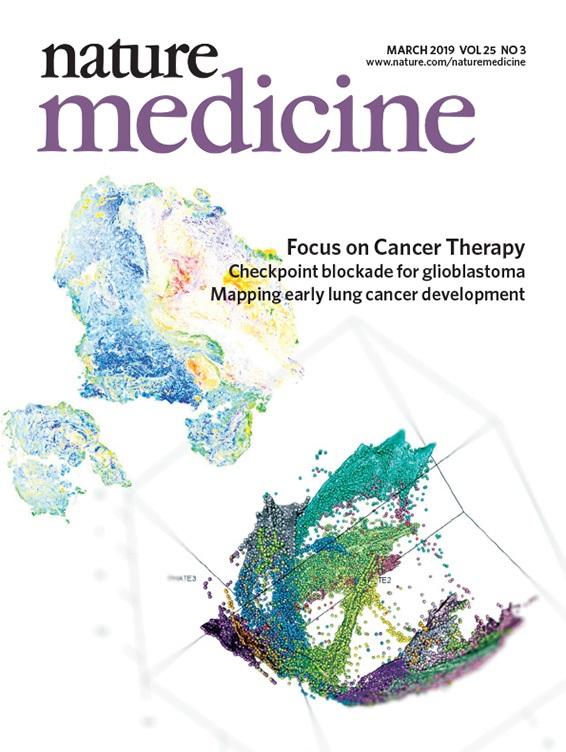Timing of immunotherapy nearly doubles survival rate in brain cancer patients
- Patients in a small randomized study with recurrent glioblastoma fared better with neoadjuvant (prior to surgery) treatment with an immunotherapy drug
- Median overall survival of patients given neoadjuvant treatment was 13.7 months compared to 7.5 months in adjuvant-only group.
In a small randomized controlled clinical trial that has intriguing implications for treating malignant brain tumors with immunotherapy, patients with recurrent glioblastomas lived nearly twice as long if they received an immunotherapy drug prior to and following surgery, compared to patients who only received the drug after surgery.
The new study, featured on the cover of the March issue of Nature Medicine by scientists from Dana-Farber Cancer Institute and the University of California at Los Angeles (UCLA), indicates that immunotherapy may work best if given in the neoadjuvant setting – before the tumor is removed – because the presence of tumor cells helps “prime” the immune response. While the randomized study included only 35 patients, the results are encouraging because they suggest that glioblastoma may be susceptible to treatment with immunotherapy, which until now hasn’t shown much effect against the deadly brain tumors.
The survival improvement with neoadjuvant immunotherapy surprised even the scientists who carried out the study, according to Patrick Wen, MD, of the Dana-Farber Center for Neuro-Oncology and co-senior author of the paper. “We initially thought it must be a fluke,” said Wen, noting that the immunotherapy drug, pembrolizumab (Keytruda) was administered to some of the patients before surgery as a scientific strategy to determine how the drug affected the tumor immune microenvironment. Pembrolizumab is an antibody that blocks the PD-1 immune checkpoint, which frees immune T-cells from constraints so that they can attack cancer cells more effectively. However careful analysis of the patients in the study showed that the two groups were very well matched.
The study found that patients receiving neoadjuvant pembrolizumab had a median overall survival of 13.7 months versus 7.5 months for patients who only received adjuvant (post-surgery) pembrolizumab. With current standard treatments of surgery and chemotherapy, the life expectancy for patients with recurrent glioblastoma is 6-9 months, the researchers said.
The researchers, who include first author Timothy Cloughesy, MD, and Robert M. Prins, PhD, of UCLA, undertook an array of molecular studies to discover the different effects of neoadjuvant and adjuvant immunotherapy on the immune environment in the tumor.
These studies revealed that the administration of neoadjuvant pembrolizumab activated immune T-cells that had infiltrated the brain tumor but had been repressed by the cancer. The pembrolizumab not only revived these T-cells, but also spurred the production of interferon-gamma, a cancer-fighting substance within the tumors, and hampered the cancer cells’ ability to reproduce and spread. By contrast, these beneficial effects were absent or reduced in tumors of patients who only received pembrolizumab following surgery to remove the tumor.
These early results “have attracted a lot of interest in a field where nothing has worked,” said Wen, referring to previous efforts to treat glioblastoma with immunotherapy. Under consideration going forward are potential trials that combine different immunotherapy agents, or pair an immunotherapy drug with an oncolytic (cancer-killing) virus. “This is a useful paradigm to study all kinds of immunotherapies,” said Wen.
An expanded trial, in which all patients will receive neoadjuvant therapy, is underway aimed at confirming the findings. In addition, future trials using combinations of immunotherapy drugs in the neoadjuvant setting are planned.
This research was funded in part by the National Institutes of Health SPORE in Brain Cancer (grant no. P50CA211015), the Parker Institute for Cancer Immunotherapy (grant no. 20163828), the Cancer Research Institute, the Musella Foundation, the Ben and Catherine Ivy Foundation, the Uncle Kory Foundation, the Defeat GBM Program of the National Brain Tumor Society, the Ziering Family Foundation and by Merck & Co., Inc. Research and/or financial support was also provided by Adaptive Biotechnologies.
Wen has received honoraria from Merck & Co.
Media Contacts
If you are a journalist and have a question about this story, please call 617-632-4090 and ask to speak to a member of the media team, or email media@dfci.harvard.edu.
The Media Team cannot respond to patient inquiries. For more information, please see Contact Us.
